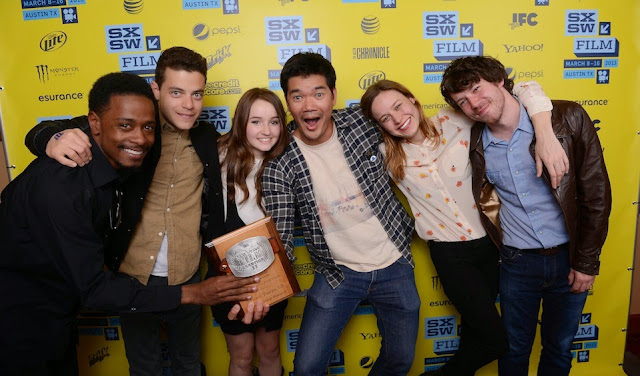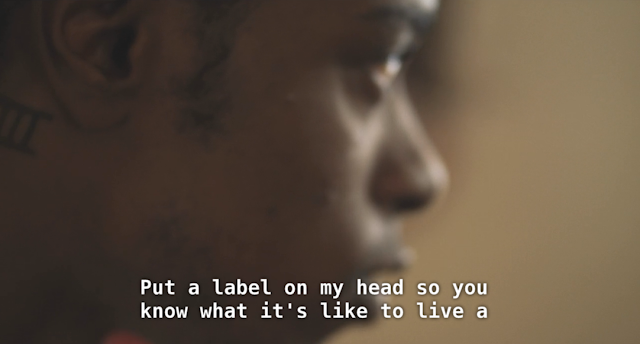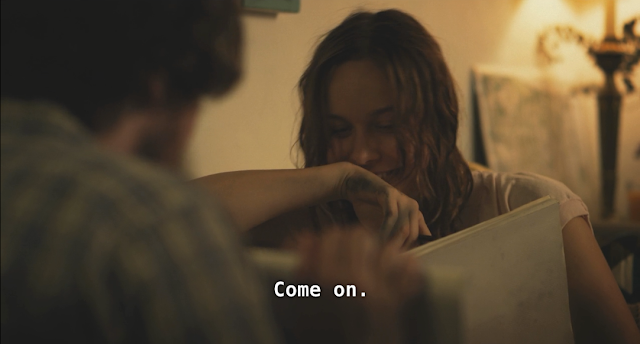 |
| Mr. Robot creator/showrunner Sam Esmail and his actors picked up the Golden Globe for Best Drama Series earlier this year. |
The second season of Mr. Robot begins this Wednesday on the USA network, three days after the network surprised the Internet by pulling a Beyoncé and posting the entire first half of Mr. Robot's two-part season premiere on Twitter, Snapchat, YouTube and usanetwork.com for only approximately an hour and 50 minutes. After that nearly two-hour period, USA deleted the episode from the four platforms--an enigmatic and cold-hearted move straight out of the titular hacktivist's playbook. So from August 5, 2015, here's a repost of my discussion of the first six episodes of Mr. Robot's compelling first season.
I still remember the date: June 18, 1990. Star Trek had killed off major, non-redshirt crew member characters before (Spock at the end of The Wrath of Khan and Tasha Yar on The Next Generation). But on that date, The Next Generation looked like it was about to go a step further and actually write its captain off the show. What the hell was going on? Was Patrick Stewart's contract not renewed? Did he piss off the Next Generation showrunner? Did he piss off someone from the Minoxidil Mafia?
June 18, 1990 was when The Next Generation finally stepped out of the shadow of the original Star Trek and proved at the end of "The Best of Both Worlds, Part I" that it was going to take certain chances with its storytelling--or rather, boldly go where no Star Trek incarnation had gone before. Sure, The Next Generation had done a few excellent episodes before--"A Matter of Honor," a standout hour where Riker temporarily serves on a Klingon ship, immediately comes to mind--but "The Best of Both Worlds, Part I" upped the ante with an especially tense hour full of possible changes to the show's status quo and moments of Starfleet being under attack in ways that hadn't been seen since Star Trek IV: The Voyage Home.
On the old Star Trek, the Enterprise's most powerful antagonists, whether it was a starship-devouring machine or an actual god, would always be defeated or outwitted by the Enterprise crew in less than an hour. But the Borg, which the Enterprise-D first encountered a year before in "Q Who," were so powerful and unstoppable during "The Best of Both Worlds, Part I" that they clearly weren't going to be put down at the end of act five, especially after they transformed Captain Picard into one of them and assimilated his skills as a commander and his knowledge of Starfleet so that they could now attack the fleet's weaknesses. And it all ended with the most memorable final line in a Star Trek story--Riker saying, "Mr. Worf, fire"--until Picard's "Five-card stud, nothing wild... and the sky's the limit" line at the end of The Next Generation's final episode, that is.
It was one hell of a way to start the summer. I really thought "The Best of Both Worlds" was going to resume the following September with Picard floating around in a white robe and playing a golden Vulcan harp. A few discussions of the impact of "The Best of Both Worlds" have tended to say, "This was before the Internet, so over the summer, Next Generation viewers shared their excitement over the cliffhanger in the most old-fashioned ways: over the watercooler, phone chats, the convention at the Ramada, telegrams, carrier pigeons..." But because these are Star Trek fans we're talking about here, many of them have always been computer-savvy, and the ones who were the most computer-savvy were actually ahead of everyone else communication-wise in 1990 when they speculated over Picard's fate on things called BBSes. Remember those?
Once in a while, a really juicy mystery comes along in the summer and rocks the pop culture world. In 1990, it was "Is Riker going to kill Picard?" In 2010, it was "Is Leonardo DiCaprio still in the dream world? Because that damn top wouldn't stop spinning!" Summer's supposed to be the time for dumb blockbusters and breezy escapism, not thought-provoking and dystopian narratives. So thanks a lot, Mr. Robot, for ruining the summer with your hacktivist leanings, your mistrust of corporations, your frustrations with economic inequality, your moral ambiguity, your clever use of (often moody) music, your unreliable narrator who can't tell apart reality from his imagination and your handful of nifty mysteries that are the next "Is Leo still asleep?"
Mr. Robot is the story of Elliot Alderson (Rami Malek), a morphine-addicted, anti-social Manhattan cybersecurity expert whose skills as a vigilante hacker attract the attention of the titular anarchist (Christian Slater), who recruits Elliot to help him and a band of hackers known as "fsociety" take down corporate America, particularly a conglomerate called E Corp. I can't think of another previous hour-long drama that debuted in the summer and was as stylish or as eerie or as playful about its storytelling as Mr. Robot. People who were born before the Vietnam War--that's all this blog's fucking readership seems to be made up of--will probably say to me, "There was The Prisoner. That premiered in the summer." First of all, stop flaunting your age and all the things you've gotten to watch and read. Second of all, I'm much younger than you. Am I supposed to care that The Prisoner was a summer replacement for Jackie Gleason's variety show? (Really? That's like if Red Skelton temporarily lent his time slot to Superjail.) I first encountered The Prisoner in the same way everyone else has: Netflix and not at all in the summer. I'm supposed to be impressed that you watched The Prisoner before everyone else was watching it? Give it a rest, alright, hipster?

















